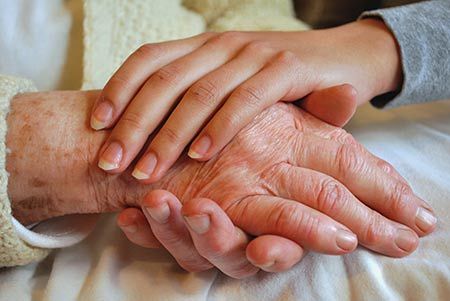
In support groups, I hear a common refrain from people whose loved one dies after an extended illness. They say initially when they get the diagnosis, everyone is very supportive and wants to help. But as the illness extends and the patient doesn’t improver, they gradually begin to fall away. The isolation becomes even more dramatic after the news that medical science can do nothing more to cure the person, and the end is approaching.
It’s not that people intend to be hurtful. But the fact is: We live in a society that fears death and does everything possible to avoid it, and that includes avoiding dying people. We don’t know what to say so we say nothing at all. We don’t want to “intrude”, so we tell ourselves the family wants to be left alone. We’ve simply never been taught how to accompany dying people or what they need. That can change. With the insights of psychology and thanatology, you can make a profound difference in another’s remaining life.
A practical example:
Dr. Ira Byock is a palliative care doctor and also a psychologist. His research shows that as people approach death, they usually go through a process of life review. They wonder whether they made a difference, whether people will miss them, and whether their absence will be noticed. Because of this, one of the things they most need to give and receive is thanks. It is incredibly meaningful when people tell dying people what lessons they learned from them, what memories stick with them from their shared lives, and how important they have been in various ways. When friends, colleagues, and family members say “Thank you”, it is gratifying and consoling, and brings peace to their dying process.
At the same time, the dying person may wish to say thank you to those who have loved them, paved their way, mentored them, or made a difference in return. For instance, when my father was in his last two weeks of life, he personally called every doctor who treated him in the past ten years and thanked them for their expertise, patience, and efforts on his behalf. Every time anyone called him or came to visit with a story or a memory of the impact he had made on their lives, he returned the favor by recalling how he was likewise affected.
Don’t Wait to Say Thank You
So when someone you care about is dying, see if you can give them one of the things they most need. Call and ask if they’d like a brief visit. Most will, although you should limit your time because dying people have limited energy. When you enter, greet them with as much affection as your relationship allows. Sit on eye level rather than standing over them as they lay in bed. Touch their arm or hand if you are both comfortable with that.
You can admit that it’s hard to visit, and it’s hard for you to know that their days on this earth are growing short. But you wanted to come because you care about them and they have been so important in your life. Then thank them for what they have meant, including stories if you can. If they want to talk, listen well and attentively. Consciously enjoy whatever conversation is possible. Laugh if laughs arise. Cry if there are tears. Allow whatever happens to unfold. When it is time to leave, thank the person for their time, and again thank them for the impact they had on your life. Tell them you will visit again if they’d like, and that you carry them in your heart always.
You will probably find these conversations to be among the most meaningful of your life. You help a dying person find peace, offer genuine comfort, and often come away with greater gifts than you could have imagined. Then take the lessons of these conversations, and apply them in your daily life, because sometimes the people we most love and appreciate will not get a diagnosis that allows time for last words.
So don’t wait to say thank you, I appreciate you, you are a treasure to me, you have taught me so much, and I love having you in my life. Fill your closest relationships with those sentiments, so that if someone you love dies tonight, they die knowing of your love and gratitude. And if you die tonight, you will die with fewer regrets about leaving things unsaid. It’s good for all of us all the time, and especially when someone you care about is facing the end of life. Don’t miss this precious opportunity.

